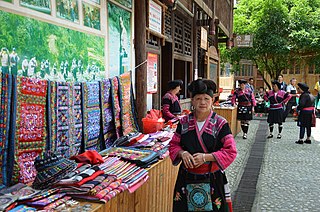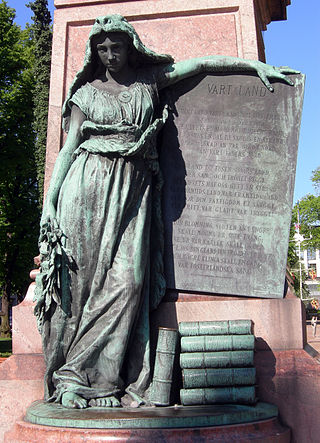A gender role, or sex role, is a set of socially accepted behaviors and attitudes deemed appropriate or desirable for individuals based on their gender or sex. Gender roles are usually centered on conceptions of masculinity and femininity.
Dominator culture refers to a model of society where fear and force maintain rigid understandings of power and superiority within a hierarchical structure. Futurist and writer Riane Eisler first popularized this term in her book The Chalice and the Blade. In it, Eisler positions the dominator model in contrast to the partnership model, a more egalitarian structure of society founded on mutual respect among its inhabitants. In dominator culture, men rule over women, whereas partnership culture values men and women equally.

Sociology of gender is a subfield of sociology. As one of the most important social structures is status. One of the most important statuses an individual claims is gender. Public discourse and the academic literature generally use the term gender for the perceived or projected (self-identified) masculinity or femininity of a person.
Michael Alan Messner is an American sociologist. His main areas of research are gender and the sociology of sports. He is the author of several books, he gives public speeches and teaches on issues of gender-based violence, the lives of men and boys, and gender and sports.
Machismo is the sense of being "manly" and self-reliant, a concept associated with "a strong sense of masculine pride: an exaggerated masculinity". Machismo is a term originating in the early 1940s and 1950s and its use more widespread in popular culture in the 60s. While the term is associated with "a man's responsibility to provide for, protect, and defend his family", machismo is strongly and consistently associated with dominance, aggression, grandstanding, and an inability to nurture. Machismo is found to be deeply rooted in family dynamics and culture in Latin America and is exclusive to the region.
Global feminism is a feminist theory closely aligned with post-colonial theory and postcolonial feminism. It concerns itself primarily with the forward movement of women's rights on a global scale. Using different historical lenses from the legacy of colonialism, global feminists adopt global causes and start movements which seek to dismantle what they argue are the currently predominant structures of global patriarchy. Global feminism is also known as world feminism and international feminism.

Since the Industrial Revolution, participation of women in the workforce outside the home has increased in industrialized nations, with particularly large growth seen in the 20th century. Largely seen as a boon for industrial society, women in the workforce contribute to a higher national economic output as measure in GDP as well as decreasing labor costs by increasing the labor supply in a society.
Gender inequality is the social phenomenon in which people are not treated equally on the basis of gender. This inequality can be caused by gender discrimination or sexism. The treatment may arise from distinctions regarding biology, psychology, or cultural norms prevalent in the society. Some of these distinctions are empirically grounded, while others appear to be social constructs. While current policies around the world cause inequality among individuals, it is women who are most affected. Gender inequality weakens women in many areas such as health, education, and business life. Studies show the different experiences of genders across many domains including education, life expectancy, personality, interests, family life, careers, and political affiliation. Gender inequality is experienced differently across different cultures.

The status of women in Nepal has varied throughout history. In the early 1990s, like in some other Asian countries, women in Nepal were generally subordinate to men in virtually every aspect of life. Historically, Nepal has been a predominantly patriarchal society where women are generally subordinate to men. Men were considered to be the leader of the family and superior to women. Also, social norms and values were biased in favor of men. This strong bias in favor of sons in society meant that daughters were discriminated against from birth and did not have equal opportunities to achieve all aspects of development. Daughters were deprived of many privileges, including rights, education, healthcare, parental property rights, social status, last rites of dead parents, and were thought to be other's property and liabilities. In the past century, there has been a dramatic positive change in the role and status of women in Nepal, reducing gender inequality. While the 1990 Constitution guaranteed fundamental rights to all citizens without discrimination on the basis of ethnicity, caste, religion, or sex, the modernization of society, along with increased education of the general population, have also played an important role in promoting gender equality. The roles of women have changed in various ways in the modern Nepalese society.

The status of women in North Korea is not fully understood outside the country, due to the political isolation of North Korea, the unwillingness of the North Korean authorities to allow foreign investigators access in the country, and the existence of conflicting reports. The official position of the North Korean government is that women have equal rights with men.

Kathleen Gerson is an American sociologist. She is considered as an authority on such subjects as gender equality particularly within relationships and marriages, changing gender roles, family housework patterns, travel patterns, finances and how they affect household formation, and other aspects of changing family life. Her research is often based on qualitative interviews. She is a tenured professor at New York University.
Feminist psychology is a form of psychology centered on social structures and gender. Feminist psychology critiques historical psychological research as done from a male perspective with the view that males are the norm. Feminist psychology is oriented on the values and principles of feminism.
A working parent is a father or a mother who engages in a work life. Contrary to the popular belief that work equates to efforts aside from parents' duties as a childcare provider and homemaker, it is thought that housewives or househusbands count as working parents. The variations of family structures include, but are not limited to, heterosexual couples where the father is the breadwinner and the mother keeps her duties focused within the home, homosexual parents who take on a range of work and home styles, single working mothers, and single working fathers. There are also married parents who are dual-earners, in which both parents provide income to support their family. Throughout the 20th century, family work structures experienced significant changes. This was shown by the range of work opportunities each parent was able to take and was expected to do, to fluctuations in wages, benefits, and time available to spend with children. These family structures sometimes raise much concern about gender inequalities. Within the institution of gender, there are defined gender roles that society expects of mothers and fathers that are reflected by events and expectations in the home and at work.

In 2021, China ranked 48th out of 191 countries on the United Nations Development Programme's Gender Inequality Index (GII). Among the GII components, China's maternal mortality ratio was 32 out of 100,000 live births. In education 58.7 percent of women age 25 and older had completed secondary education, while the counterpart statistic for men was 71.9 percent. Women's labour power participation rate was 63.9 percent, and women held 23.6 percent of seats in the National People's Congress. In 2019, China ranked 39 out of the 162 countries surveyed during the year.

Women in Bulgaria refers to women who live in and are from Bulgaria. Women's position in Bulgarian society has been influenced by a variety of cultures and ideologies, including the Byzantine and Ottoman cultures, Eastern Orthodox Christianity, communist ideology, and contemporary globalized Western values.

Women in Finland enjoy a "high degree of equality" and "traditional courtesy" among men. In 1906, the women of Finland became the first women in Europe to be granted the right to vote. There are many women in Finland who hold prominent positions in Finnish society, in the academics, in the field of business, and in the government of Finland. An example of powerful women in Finnish politics is Tarja Halonen, who became the first female president of the country. In religion, where most of the Finnish people are members of the Evangelical Lutheran Church of Finland, women can be ordained as priests. In terms of finance, Finnish women have been described as "usually independent financially". The Telegraph wrote in 2006:
Finnish women are much more outgoing and approachable than the men and often command three or four languages. Their position in society and business is well-respected and superior to that of women in most other cultures.
Women in positions of power are women who hold an occupation that gives them great authority, influence, and/or responsibility in government or in businesses. Historically, power has been distributed among the sexes disparately. Power and powerful positions have most often been associated with men as opposed to women. As gender equality increases, men still hold more power, including in politics and athletics.
Gender plays a role in mass media and is represented within media platforms. These platforms are not limited to film, radio, television, advertisement, social media, and video games. Initiatives and resources exist to promote gender equality and reinforce women's empowerment in the media industry and representations. For example, UNESCO, in cooperation with the International Federation of Journalists, elaborated the Gender-sensitive Indicators for Media contributing to gender equality and women's empowerment in all forms of media.
Taiwan has a complex history of feminist and women's rights movements with periods of progressiveness where feminism and strong female icons flourished and periods of strict authoritarianism where equality and individual rights were devalued. Thanks in part to the work of generations of feminists, Taiwan is nowadays one of the most gender-equal countries in Asia, consistently ranking higher than its East Asian neighbors in international indices on gender equality.
Gender inequality in curriculum exposes indications that female and male learners are not treated equally in various types of curriculum. There are two types of curricula: formal and informal. Formal curricula are introduced by a government or an educational institution. Moreover, they are defined as sets of objectives, content, resources and assessment. Informal curricula, also defined as hidden or unofficial, refer to attitudes, values, beliefs, assumptions, behaviours and undeclared agendas underlying the learning process. These are formulated by individuals, families, societies, religions, cultures and traditions.







